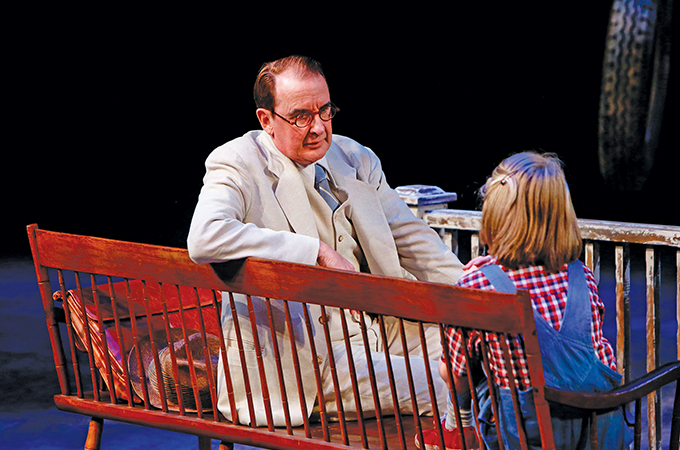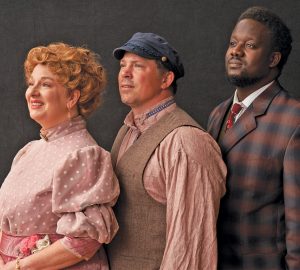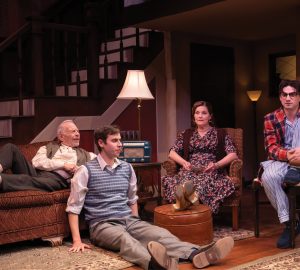The first of many heart-stopping moments in The Rep’s production of To Kill a Mockingbird happens within seconds, when Jean Louise Finch (a grown-up Scout) puffs life into the set. As the tree stretches out its branches and tufts of grass grow up, she corrects an overturned porch bench and sets a tire swing (and her memories) in motion. Considering the potential for staleness with a classic like this (in 56 years, the book has never been out of print and more than one million copies are sold each year), the Rep’s deft handling feels thrillingly fresh and tells us right away we are in for a treat. Indeed, we are.
It is 1935 in Maycomb, Alabama, and although the small town is in the grip of the Great Depression, summer for Scout and her brother still is “everything good to eat … a thousand colors in a parched landscape.” While they and their friend Dill (who Harper Lee modeled on her own childhood friend Truman Capote) concern themselves with childish things (mainly the mystery surrounding their reclusive neighbor Boo Radley), their father, Atticus Finch, takes on the inhumanities of society in the Jim Crow era. Those ‘thousand colors’ are beautifully introduced when Miss Maudie wheels in a barrow of flowers, and the set’s sky, fashioned from rough boards and a few tin stars, is a dusty old flag, desiccated as the landscape it spans. (In the second act, when an innocent Tom Robinson is being tried before a white jury for the rape of a white girl and the country’s morals hang in the balance, the ‘flag’ appears more ragged still).
We certainly cannot forget the historical backdrop to this coming-of-age tale, for scenes are punctuated throughout by black voices raised in mournful spiritual song. It’s a powerful, haunting soundtrack that reminds us again and again of a history of racial wrongs.
Risa Brainin directs the show and has cast her characters perfectly. Atticus Finch, the personification of kindness and integrity, is played by a gentle Jonathan Gillard Daly. Jem and Scout are played by local twins Ronan and Kaylee Ryan, and Charlie Mathis, age 9, makes his Rep debut as a captivatingly impish Dill.
Brainin says she always starts her process by asking “why this play, at this time, for this audience?” In the wake of Ferguson and other events, she was keen to ask herself how different are the circumstances for the African-American community today than they were in 1935. The timelessness of this story—the fact that its appeal to empathy and justice is just as relevant now as it was then—makes it, without question, a must-see.
Pictured: Jonathan Gillard Daly as Atticus Finch with Kaylee Ryan as Scout
Photo: Jerry Naunheim








